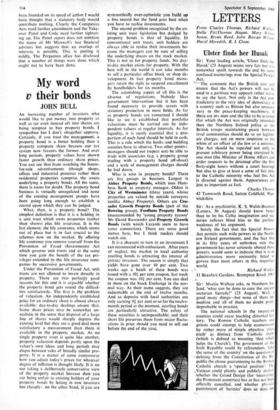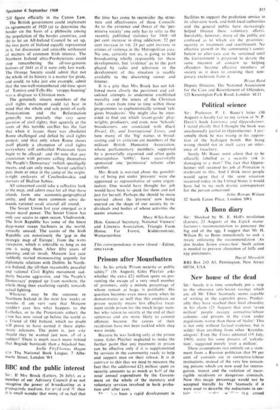LETTERS
From Charles Thomas, Richard Walker, Stella FitzThomas Hagan, Mary W hae- house, Bryan Reed, John Rowan Wilson, David Meredith, R. L Close.
Ulster finds her Husak
Sir: Your leading article, 'Ulster finds her Husak' (23 August) seems very fair but it is somewhat spoilt towards the end by some confused mutterings over the Special Power, Act.
Ir"The comment that the British Goc will insure that the Act's powers will not be used in a partisan way appears rather naise. to say the least. Not only is the Act con- tradictory to the very idea of democracy in a country such as Britain but also unneces- sary to the peace-keeping machinery. If there are IRA men and the like to be arrested (for which the Act was originally intended) then the Northern Ireland police or the British troops maintaining peace between rival communities should do so on legitim- ate charges, not on mere suspicion or the whim of an officer of the law or a minister. The Act should be repealed not only to prevent arbitrary power being exercised by one man (the Minister of Home Affairs can order suspects to be detained after the first forty-eight hours without a court hearing) but also to give at least a sense of fair play to the Catholic minority who feel this Act is directed against them. Appearances are just as important as fact. .
Charles Thornily 42 Tamworth Road, Sutton Coldfield, War- wickshire Sir: As a psychiatrist, K. S. Walsh-Brennan (Letters, 30 August) should know better than to let his Celtic imagination and sec- tarian reflexes blind him to the perilous weakness of his argument.
Surely the fact that the Special Powers Act permits such wide powers to the North- ern Ireland government, and the fact that in its fifty years of unbroken rule that government has never seriously abused those powers, would seem to indicate that it is an administration more eminently fitted to govern than most others in this imperfect world.
,, • Richard Walker 11 Beaufort Gardens, Brompton Road, SW3 a: Sir: Martin Wallace asks, re Northern Ire- land, 'what can be done to cure the ancient sectarian hatreds?' (23 August). Well. a good many things—but none of them im- mediate and all of them no doubt pretty improbable in practice.
The national schools in the twenty-six counties could cease teaching distorted his- tory. The Roman Catholic teachers and priests could attempt to help ecumenicism by rather more of simple objective 'plain truth' as distinct from 'Catholic truth' (which is defined as meaning 'that which helps the Church'). The government of the Irish Republic could by referendum. 'take the sense of the country' on the question of - .:deleting from the Constitution of the Re- public the clause guaranteeing to the Roman Catholic church a 'special position'. The ,rVatiean could plainly and publicly declare whether the Grand Design (for 'recovering the Protestant countries) has or has not been officially cancelled, and whether physical punishment of 'heretics' does or does not
dill figure officially in the 'Canon Law.
The British government could implement its agreements of 1920 (a) to determine the border on the basis of a plebiscite among the population of the border countries, and (b) to let an All-Ireland Council be set up, the two parts of Ireland equally represented in it, for discussion and amicable settlement of matters of common Irish interest. The Northern Ireland ultra-Presbyterians could stop remembering the all-too-genuine horrors of 1641 as if it were only last week. The Orange Society could admit that not the whole of its history is a matter for pride, and could, to take just one example, admit that the too-well-remembered old-time sport of Tantivy-and-Tally-Ho 'croppy-hunting' was a disgrace to Christian men.
The genuinely sincere members of the civil rights movement could (a) bear in mind that the whole and sole point of early Protestantism and the Reformation generally was precisely that very same question of civil rights; that squarely at the roots of this terrible conflict lies the fact that when it began, there was absolutist Rome challenged and defied by civil rights protest; and that only when Rome shows itself plainly a champion of civil rights everywhere will embattled Protestant fears begin to be allayed: and (b) note that any association with persons calling themselves `the People's Democracy' (which specifigally means, and.can only mean, 'Soviet satellite') puts them at once in the camp of the might- is-right enslavers of Czechoslovakia and starvers of Biafran babies.
All concerned could take a reflective look at the map, and admit once for all that these islands form one economic-geographical entity, and that mere common sense de- mands rational modi vivendi all round: The Soviet Union last year emerged as a major naval power. The Soviet Union has only one access to open ocean, Vladivostok. The Irish Republic has some of the finest deep-water ocean harbours in the world, virtually unused. The coasts of the Irish Republic are notoriously the 'gap in the strategic map of Europe', from the N1TO viewpoint, which is tolerable so long as no one is using them. After fifty years of ignoring and/or insult, Moscow last year suddenly started manoeuvring urgently for diplomatic relations with Dublin. In North- ern Ireland, the till-then reasonably peaceful and rational Civil Rights movement sud- denly became aggressive, and 'the People's Democracy' popped up from nowhere, the whole thing then escalating rapidly towards actual fighting.
Whatever may be the outcome re Northern Ireland in the next few weeks or months (I am very sure that Moscow couldn't care less what happens to the Catholics, or to the Protestants either), the USSR has now stood up before the world as a Friend of Old Ireland, which no doubt will prove to have earned it those diplo- matic relations. The point is, just why should they be wanted just now, all of a sudden? There is much much more behind that Bogside barricade than a hijacked bus.
Stella FitzThonta.v Hagan c/o The National Book League, 7 Albe- marle Street, London WI



































 Previous page
Previous page